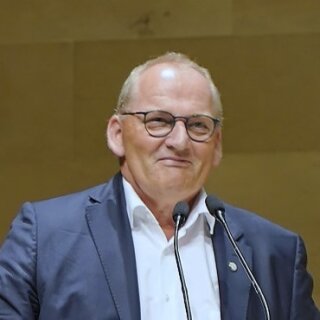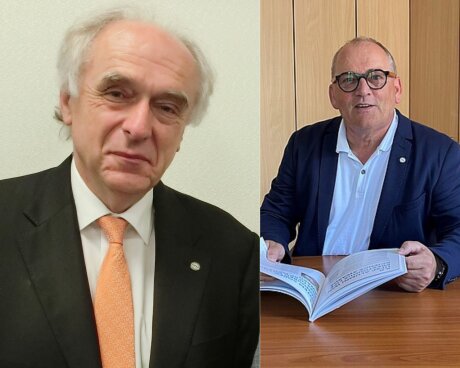"Our model has led to unprecedented success": HFSPO's strategy and priorities for years to come
"Our model has led to unprecedented success over 35 years, with no member country ever missing a payment. We've created a niche for those who truly want to showcase their talent without limitations", states Pavel Kabat Secretary-General of the HFSPO (International Human Frontier Science Program Organisation), in an interview with News Tank on 18/07/2024.
The Human Frontier Science Program was founded in 1989 to advance international research and training at the frontier of the life sciences. It is supported by 16-member countries and by the European Commission representing 24 additional countries.
They "pool their contributions into a single fund without conditions. This allows the organisation to fund the best science without political or geopolitical influence, focusing solely on scientific excellence", indicates Pavel Kabet.
"Of our approximately $60 M budget, more than 90% goes directly to supporting research sites", says Guntram Bauer, Chief scientific officer of HFSPO. "The grant program has a total success rate of about 4.5%, and the fellowship programme is around 10%. This shows how competitive our programmes are."
In June 2023, the last triennial meeting of members "was quite a breakthrough for several reasons", declares Pavel Kabet.
• "First, the board of trustees approved a nine-year strategy, which had never happened before.
• We've also launched new programmes, one of which is called 'HFSP Accelerator'.
• The members agreed to increase the core funding of the organisation by almost 40% in two steps. This is significant, as it now includes annual increases."
"Our current budget is at about $60 M, which will increase to $70 M by 2026 (...) We want the European Commission to increase its contribution to HFSP", also declares Pavel Kabat.
Can you describe the key features that distinguish HSFPO from other research funding organisations?

The HFSPO is a unique multilateral, international, and non-governmental organisation. It is distinctive because its 16-member countries and nowadays the European Commission (representing 24 additional countries) pool their contributions into a single fund without conditions. This allows the organisation to fund the best science without political or geopolitical influence, focusing solely on scientific excellence.
Our final distinguishing feature is the freedom to use the funds we provide. Recipients of Research Grants receive a flat amount and can allocate it as they see fit, whether for hiring postdocs or purchasing equipment. This flexibility extends to transferring funds across countries, solely to enhance scientific research.
Our model has led to unprecedented success over 35 years, with no member country ever missing a payment. This voluntary, contribution-based approach has resulted in significantly higher academic performance compared to other organisations, including three times more publications and citations, and 29 Nobel Prize laureates.
Unlike many funding bodies, we encourage curiosity-driven research »Additionally, we emphasise innovation and economic value without requiring upfront promises of societal impact. Unlike many funding bodies, we encourage curiosity-driven research, allowing for high-risk, high-reward projects. This approach has led to numerous innovations, patents, and spin-off companies, generating substantial economic benefits.
This success demonstrates the value of investing in risky science and building trust with researchers, ultimately benefiting both science and the economy.
You celebrated your 35th anniversary this year. What is your assessment of HFSPO’s situation?
Pavel Kabat: Our 35th anniversary is a celebration of our long-term success, despite many challenges along the way. We’ve remained resilient through various geopolitical complications.
Academically, we’ve achieved a lot, including special contributions to innovation. This milestone also celebrates the privilege of supporting human creativity. In our system, researchers feel free to think creatively without the pressure of strategically formulating proposals or reports. We liberate them from that burden, which is very rewarding.
When I joined in July 2021, post-Covid, I couldn’t travel, so I organised 50 random calls with our global community of over 8,500 members and alumni.
I asked them what HSFP means to them:
- Are we just a funder where they submit a proposal and move on if they fail?
- Or are we an organisation whose experience is so reputable that they want it on their CV, even without success?
- Or are we the only door they cannot miss with a great idea?
The majority chose the latter options, indicating our unique niche and significant impact.
We’ve created a niche for those who truly want to showcase their talent without limitations. This is our story, and I think it speaks for itself.
How much can you give to researchers each year?
Pavel Kabat: Of our approximately $60 M budget, more than 90% goes directly to supporting research sites.
Guntram Bauer: We have a very low overhead, indirect cost, small staff, and very efficient workflows. More than 92% of our annual budget goes to support the research projects that are selected and recommended for funding.
Our grant programme is probably the only one in the world where applicants don’t have to fill in budget sheets, which has two advantages.
Reviewers judge the science, not the budget »First, the team that applies doesn’t need to discuss and argue over how much goes to which laboratory. The same is true for the reviewers because often reviewers get dragged down in budget discussions. This way, reviewers judge the science, not the budget.
The same is true for our fellowship programme, which is an international mobility programme. You can apply right after your PhD or during your first postdoctoral research, up to three years after your PhD. The bar is very high because, just like the interdisciplinary collaboration in our grant programme, applicants for the fellowship need to change research direction.
No detailed budget outline is needed. The focus is entirely on the scientific excellence of the research.
HFSP Fellows need to move to a new country where they’ve never lived and worked before, find a host laboratory, and hash out ideas and research projects with an academic researcher or professor with whom they’ve never worked before. This is quite an audacious operation for young scientists.
What is your selection rate and how many people are involved in the projects funded?
Guntram Bauer: In our research grant programme, we start with around 700 submitted letters of intent, which go through several steps. In the end, we fund about 32 to 34 grants per year.
And in the fellowship programme, we start with a similar number, around 600 or 700, and we fund 60 to 65 fellowship proposals.
The grant programme has a total success rate of about 4.5%, and the fellowship programme is around 10%. This shows how competitive our programmes are.
Pavel Kabat: On average, each grant involves three investigators from different countries. So, each year we have about 110 new investigators. Each investigator has their own team, usually three to four postdocs. So, in total, it’s about 400-500 new scientists starting to work on our supported projects every year. It’s not just 34 grants; it’s actually many more people involved.
Would you be able to fund more projects and scientists and do you intend to do so?
Guntram Bauer: It’s a declared goal of HFSP to grow by increasing our budget, hoping to get more contributions from existing members and to admit new member countries. This way, we can support more grants and fellowships.
A nine-year strategy with a funding increase
You mentioned wanting more resources and perhaps more countries joining you. What are your objectives for the next 35 years?
Pavel Kabat: Sure. The governance of our programme includes a triennial meeting of members from the supporting parties, previously known as the intergovernmental meeting. The most recent one took place in 2023 in Paris, alongside an essential symposium. This meeting was quite a breakthrough for several reasons.
First, the board of trustees approved a nine-year strategy, which had never happened before. This strategy includes several high-level targets, such as closing the ‘frontier gap’-supporting frontier projects that we can’t fund every year due to budget constraints. Every three years, we will evaluate this strategy and adjust our approach as needed.
We’ve also launched new programmes, one of which is called ‘HFSP Accelerator.’ This programme focuses on including countries we previously mentioned, aiming for greater inclusivity.
Every three years, members sign the Joint Communique, an official document where they commit to supporting the next three years.
During the Paris meeting, the members agreed to increase the core funding of the organisation by almost 40% in two steps. This is significant, as it now includes annual increases.
Members, including France, have committed to reaching their share of the target budget. Our current budget is at about $60 M, which will increase to $70 M by 2026. The contributions are based on the GDP Gross domestic product of the member countries. Some countries have already committed fully, while others are taking steps annually. Our clear target is $70 M by 2026, and for the next three years, it is set to $80 M.
Additionally, we are planning to hold frontier workshops to set the scene globally and inform and stimulate programmes through position papers. We also have major equity and inclusiveness targets, among other objectives.
The Paris summit in June 2023:
"The Paris summit is one example of how we direct science funding and try to shape science policy. We organised a summit under the patronage of President Macron to bring together environmental scientists and fundamental researchers in molecular biology and brain science", declares Pavel Kabat.
"These communities had never collaborated before. The summit showed what could be achieved by combining these fields, such as finding solutions for climate and ocean challenges.
This unique approach is something we hope will be reflected in funding across our members, and in Horizon Europe funding, encouraging interdisciplinary collaborations that were previously overlooked."
The link with the ERC European Research Council and science diplomacy
Do you look for partnerships with universities? Who do you work with?
Guntram Bauer: No, we don’t interact directly with universities concerning team building. The teams and postdoc fellows find their own placements. We don’t get involved in the placement process. They search for host laboratories through the professional network of their home advisors, like their PhD advisor, or through contacts they make at conferences. So, we don’t directly interfere with the matchmaking process.
Do you collaborate with other organisations like the ERC?
Pavel Kabat: Yes, we do collaborate. The president of the ERC and I meet regularly. While both organisations support basic research, there are differences. We are global and multilateral, while they are predominantly European. We can take on slightly more risk without needing evidence, unlike the ERC, which has to adhere more to European Commission rules. For instance, some of the ERC review panel member’s decisions would still rest on the PIs profile, past achievements and previous research experience, whereas these aspects are as much as possible deemphasised in the HFSP assessment process.
Ensuring excellence while promoting inclusivity and equity »We meet and discuss, in order to tackle common challenges. For example, an issue we face is ensuring excellence while promoting inclusivity and equity. Much of the funding tends to go to historically advantaged countries like the UK United Kingdom , Netherlands, and France. Similarly, many grants go to top institutions like Harvard and Cambridge.
We need to bridge the gap and connect with talented researchers in places like India and South Africa. Traditional development cooperation hasn’t worked, so we’re inventing new ways to bring these bright minds to the forefront quickly.
Do you use your experience and success at the European level to impact policy, such as the next framework programme? Do you engage in political action?
We want the European Commission to increase its contribution to HFSP. »
Pavel Kabat: Much of my work involves science diplomacy-meeting presidents of funding organisations ministers and commissioners. Our message at a general level is about the importance of both mission-driven, impact-focused research and unbound research like ours. For example, last week in Washington, D.C., we held a high-level meeting to advocate for this balanced approach in future funding frameworks in the US and Europe, like Horizon Europe, starting in 2027. We want the European Commission to increase its contribution to HFSP.
Do you see opportunities for connecting different areas of research within European programmes?
Pavel Kabat: Yes, European programmes have separate pillars for environment, health, etc. We see possibilities for connecting these fields. For instance, we recently connected environmental science with fundamental research in molecular biology. This kind of interdisciplinary approach is new and holds great potential. We hope future funding programmes will support such innovative collaborations, which haven’t been the focus so far. This frontier approach is a hallmark of our work.
The selection of the reviewers and the work of committees
How do you manage the quality and diversity of your review committees?

We select reviewers who are experts in their fields but can also review beyond their special realm of expertise. Additionally, we need to rotate both expertise and country representation. For instance, we can’t always have a neuroscientist from a single country.
This process is time-consuming and involves sending many invitation emails and dealing with rejections because it’s quite a commitment for an already busy scientist to help review HFSP proposals.
Intense scientific discussions over three days »The number of reviewers varies between 22 and 24 per committee. They do a lot of work remotely, but in January, we have a meeting where they come for final discussions on the best applications.
This involves intense scientific discussions over three days, which are very enlightening. Following these discussions for 20 years has been fascinating because you get to read truly innovative research proposals. This is where the decision-making process culminates.
There is a European initiative to change how research is assessed, known as Coara Coalition for Advancing Research Assessment . How do you view this? How does this impact your way of evaluating projects?
Pavel Kabat: Science Europe decided to go with Coara to broaden the spectrum of indicators used to assess programmes, including social and societal equity issues. This has sparked a big debate, especially in my home country, the Netherlands, where some scientists are against it, seeing it as a dilution of scientific quality.
In our case, the success formula has always been ‘science, science, science’. It doesn’t matter who you are, your race, age, or gender. We just look at the science. However, all in all, Coara is timely and very much needed framework, under which the future of the scientific enterprise should be further debated.
Guntram Bauer: We evaluate based on research quality and scientific excellence, avoid ‘rating’ scientists using citation indices. However, the Coara proposal is interesting
Over the last 35 years, we have supported researchers in some 70+ different countries , and therefore it is difficult to adopt a system that may be applicable in all situations. We’re preparing for an HFSP review in the coming year, and this will play a role in evaluating our programme.

Pavel Kabat
Secretary General @ International Human Frontier Science Program Organization (HFSPO)
Professor and chair @ Wageningen University
Visit in the directory
Career
Secretary General
Professor and chair
Chief Scientist and Director Research
Director General and Chief Executive Officer
Chair and director
# 51985, created on 18/07/24 at 10:06 - Updated on 18/07/24 at 10:09

Guntram Bauer
Chief scientific officer @ International Human Frontier Science Program Organization (HFSPO)
Visit in the directory
Career
Chief scientific officer
Director of science, policy and communications
Acting chief operations officer
Director of science and communications
Director of fellowships
Coordinator for an international PhD program
Postdoctoral Research Associate
Studies & Diploma
PhD
# 51987, created on 18/07/24 at 10:15 - Updated on 18/07/24 at 13:31

